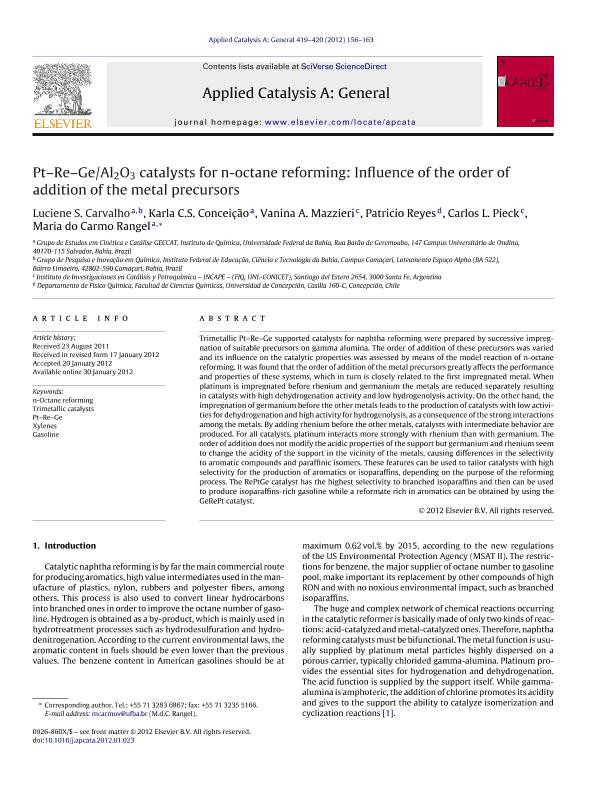Mostrar el registro sencillo del ítem
dc.contributor.author
Carvalho, Luciene S.
dc.contributor.author
Conceição, Karla C.S.
dc.contributor.author
Mazzieri, Vanina Alejandra

dc.contributor.author
Reyes, Patricio
dc.contributor.author
Pieck, Carlos Luis

dc.contributor.author
Rangel, Maria do Carmo

dc.date.available
2019-06-21T00:15:02Z
dc.date.issued
2012-03
dc.identifier.citation
Carvalho, Luciene S.; Conceição, Karla C.S.; Mazzieri, Vanina Alejandra; Reyes, Patricio; Pieck, Carlos Luis; et al.; Pt-Re-Ge/Al 2O 3 catalysts for n-octane reforming: Influence of the order of addition of the metal precursors; Elsevier Science; Applied Catalysis A: General; 419-420; 3-2012; 156-163
dc.identifier.issn
0926-860X
dc.identifier.uri
http://hdl.handle.net/11336/78590
dc.description.abstract
Trimetallic Pt-Re-Ge supported catalysts for naphtha reforming were prepared by successive impregnation of suitable precursors on gamma alumina. The order of addition of these precursors was varied and its influence on the catalytic properties was assessed by means of the model reaction of n-octane reforming. It was found that the order of addition of the metal precursors greatly affects the performance and properties of these systems, which in turn is closely related to the first impregnated metal. When platinum is impregnated before rhenium and germanium the metals are reduced separately resulting in catalysts with high dehydrogenation activity and low hydrogenolysis activity. On the other hand, the impregnation of germanium before the other metals leads to the production of catalysts with low activities for dehydrogenation and high activity for hydrogenolysis, as a consequence of the strong interactions among the metals. By adding rhenium before the other metals, catalysts with intermediate behavior are produced. For all catalysts, platinum interacts more strongly with rhenium than with germanium. The order of addition does not modify the acidic properties of the support but germanium and rhenium seem to change the acidity of the support in the vicinity of the metals, causing differences in the selectivity to aromatic compounds and paraffinic isomers. These features can be used to tailor catalysts with high selectivity for the production of aromatics or isoparaffins, depending on the purpose of the reforming process. The RePtGe catalyst has the highest selectivity to branched isoparaffins and then can be used to produce isoparaffins-rich gasoline while a reformate rich in aromatics can be obtained by using the GeRePt catalyst.
dc.format
application/pdf
dc.language.iso
eng
dc.publisher
Elsevier Science

dc.rights
info:eu-repo/semantics/openAccess
dc.rights.uri
https://creativecommons.org/licenses/by-nc-sa/2.5/ar/
dc.subject
Gasoline
dc.subject
N-Octane Reforming
dc.subject
Pt-Re-Ge
dc.subject
Trimetallic Catalysts
dc.subject
Xylenes
dc.subject.classification
Otras Ingeniería Química

dc.subject.classification
Ingeniería Química

dc.subject.classification
INGENIERÍAS Y TECNOLOGÍAS

dc.title
Pt-Re-Ge/Al 2O 3 catalysts for n-octane reforming: Influence of the order of addition of the metal precursors
dc.type
info:eu-repo/semantics/article
dc.type
info:ar-repo/semantics/artículo
dc.type
info:eu-repo/semantics/publishedVersion
dc.date.updated
2019-06-19T12:19:07Z
dc.journal.volume
419-420
dc.journal.pagination
156-163
dc.journal.pais
Países Bajos

dc.journal.ciudad
Amsterdam
dc.description.fil
Fil: Carvalho, Luciene S.. Universidade Federal da Bahia; Brasil
dc.description.fil
Fil: Conceição, Karla C.S.. Universidade Federal da Bahia; Brasil
dc.description.fil
Fil: Mazzieri, Vanina Alejandra. Consejo Nacional de Investigaciones Científicas y Técnicas. Centro Científico Tecnológico Conicet - Santa Fe. Instituto de Investigaciones en Catálisis y Petroquímica "Ing. José Miguel Parera". Universidad Nacional del Litoral. Instituto de Investigaciones en Catálisis y Petroquímica "Ing. José Miguel Parera"; Argentina
dc.description.fil
Fil: Reyes, Patricio. Universidad de Concepción; Chile
dc.description.fil
Fil: Pieck, Carlos Luis. Consejo Nacional de Investigaciones Científicas y Técnicas. Centro Científico Tecnológico Conicet - Santa Fe. Instituto de Investigaciones en Catálisis y Petroquímica "Ing. José Miguel Parera". Universidad Nacional del Litoral. Instituto de Investigaciones en Catálisis y Petroquímica "Ing. José Miguel Parera"; Argentina
dc.description.fil
Fil: Rangel, Maria do Carmo. Universidade Federal da Bahia; Brasil
dc.journal.title
Applied Catalysis A: General

dc.relation.alternativeid
info:eu-repo/semantics/altIdentifier/doi/http://dx.doi.org/10.1016/j.apcata.2012.01.023
Archivos asociados
